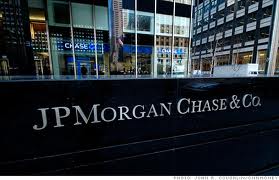(Washington Post)

What was the trade?
As Michael Hiltzik of the Los Angeles Times writes, we don’t need to get too technical here. “Leaving aside the sophistication of the transactions themselves, JPMorgan’s trader, a London-based derivatives expert whose portfolio was so outsized he became known in the markets as the London Whale, essentially bet that corporate debt was becoming less risky as corporations were getting stronger -- in trading parlance, he was long corporate debt. But he did so in a way that even a tiny hiccup in the index he was trading could be exploited by rival traders. And that’s what happened.” If you want to get technical, however, FT Alphaville has you covered.
How did they make this mistake?
No one really knows yet. Matt Levine, the editor of Dealbreaker, thinks they simply messed up the math that was governing the trade. “This looks like the CIO’s trading desk modelling the actual [profits and loss] and risks of the trade wildly wrong. That seems to me like the simplest way to lose a billion dollars without noticing it. You can see that in Jamie’s ‘just ’cause we’re stupid doesn’t mean everybody else was’: this was not driven by the market moving against them (though it seems to have), it was driven by them getting the math wrong.”
How much did JP Morgan lose on it?
We don’t know. We probably won’t know for awhile. The number $2 billion is floating around. But it could easily be closer to $5 billion when all is said and done. The key here is that the trade isn’t over. JP Morgan Chase is still trying to get out of its positions. How quickly they do that, and where the market moves between now and then, will decide the extent of their total losses.
Will JP Morgan need a bailout?
No. It’s hard to believe, but $2 billion, or even $5 billion, just isn’t that much money to the bank. In 2011, JP Morgan’s profits were $19 billion in 2011. And CEO Jamie Dimon called that “mildly disappointing” at the time.
So does this matter at all?
Yes.
Why?
For one thing, JP Morgan was known as the best manager of risk on Wall Street. That’s largely because they made it through the financial crisis mostly unscathed. But it turns out that even the best manager of risk isn’t very good. This trade, in fact, looks a lot like the financial crisis: They bet on something unlikely as if it was impossible. That’s what all those banks did when they made bets on the belief that the housing market never goes down everywhere all at once. It’s a reminder that this is a kind of mistake that even “good” banks make. And remember -- JP Morgan made this mistake less than four years after the fall of Lehman Brothers, so this came at a time when the lessons of the crisis are fresh in everyone’s mind, and when regulators are watching closely.
So that’s it? The national media is engaged in a collective attack of post-traumatic stress because the only bank it kinda-sorta trusted did something dumb?
No. There’s a political dimension here, too. JP Morgan has used its sterling reputation to fight the Volcker rule. That’s the regulation that says that banks that take commercial loans and get federal insurance to protect those loans -- banks that you might open a checking account with, like JP Morgan -- can’t make speculative bets on their own behalf. If you’re going to be a bank, then you can’t play at the casino.
The problem is that it’s very hard to say when a bank is betting on its own behalf and when its betting on its clients’ behalf. JP Morgan says that this trade was a “hedge”: It was there to reduce risk, not make money. But given how exquisitely it blew up in JP Morgan’s face, now regulators are going to make sure that the Volcker rule would stop trades like this one from happening. Otherwise, they’ll get the blame next time. That means a much tighter Volcker rule -- which in turn means JP Morgan (and other banks) won’t make as much money in the coming years. That’s part of why all their stocks are tumbling. JP Morgan, for instance, lost $14.5 billion on Friday.
And the government may not stop with the Volcker rule. The SEC has opened an investigation. And remember: this is an election year. If a few congressmen band together to propose some much more stringent regulations on the banks, there’s some chance that they could sail through as both parties try to show they’re tougher on the banks.



